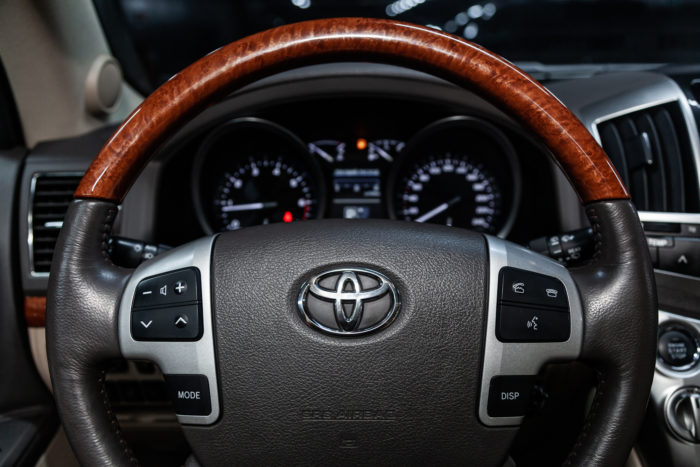Top Class Actions’s website and social media posts use affiliate links. If you make a purchase using such links, we may receive a commission, but it will not result in any additional charges to you. Please review our Affiliate Link Disclosure for more information.

Plaintiff Linda Drake says the intermediate drive shaft causes a clunk, pop, or knock-type noise when the steering wheel is turned to the left or right.
She says the steering wheel defect can be exhibited when the cars are parked or when on the highway.
Drake says she bought a used 2009 Toyota Highlander in 2012. Before she purchased the vehicle, she viewed advertisements about the car, took it for a test drive, and spoke to the Toyota sales representative about the car’s features, including those dealing with safety.
In March 2013, she claims that she noticed a noise while she was shifting gears and, at times, her vehicle did not shift at all.
She claims that she contacted the dealership to secure warranty coverage for her car, but the dealership denied her request, claiming that the noise she heard in the car could not be replicated and that the noise would eventually pass.
The plaintiff alleges that the noise caused by the steering wheel defect distracts drivers as it moves their attention from the road to the noise. In addition, one side effect of the steering wheel defect is that the cars are unable to shift gears.
The Toyota class action states that other car owners have reported that the power steering fails because of the defect.
“This fundamental inability to operate could result in perilous situations, thereby placing both the driver of the Class Vehicle and fellow motorists in serious danger,” according to the plaintiff.
Drake claims that the defendants have had long-standing knowledge of the defect in the steering wheel and have sold thousands of cars without disclosing this information to consumers.
The Toyota steering wheel class action lawsuit also alleges that Toyota’s service technicians deny that the steering wheel defect exists and say that the issue occurs from normal wear and tear on the car.
Drake claims that Toyota has had knowledge of the steering wheel defect since 2013 when they issued Technical Service Bulletins (TSBs) which told dealers about the defect and proposed “fixes” at the vehicle owner’s expense. These TSBs were never communicated to the vehicle owners, according to the Toyota class action lawsuit.
In addition, the plaintiff alleges that Toyota has hidden the steering wheel defect from vehicle owners, have not recalled the cars to fix the problem, have not offered customers a replacement for free and have not offered to reimburse those who have paid out-of-pocket to repair the defect.
“In short, as a result of Defendants’ unfair, deceptive, and/or fraudulent business practices, current and former owners and/or lessees of Class Vehicles, including Plaintiff, have suffered an ascertainable loss of money, property, and/or loss in value,” the Toyota class action lawsuit argues.
The plaintiff states that if she had known about the defect in the steering wheel of her car, she would not have purchased the vehicle or would have paid less for it.
Do you own a Toyota with a steering wheel defect? Leave a message in the comments section below.
The plaintiff is represented by Jordan L. Lurie and Ari Y. Basser of Pomerantz LLP
The Toyota Steering Wheel Defect Class Action Lawsuit is Linda Drake v. Toyota Motor Corp, et al., Case No. 2:20-cv-01421, in the U.S. District Court for the Central District of California.
ATTORNEY ADVERTISING
Top Class Actions is a Proud Member of the American Bar Association
LEGAL INFORMATION IS NOT LEGAL ADVICE
Top Class Actions Legal Statement
©2008 – 2024 Top Class Actions® LLC
Various Trademarks held by their respective owners
This website is not intended for viewing or usage by European Union citizens.















259 thoughts onToyota Class Action Alleges Steering Wheel Defect
I have a 2012 Toyota Highlander SE 3.5V6. Please include me.
I have a 2009 highlander that I bought used last year. Same problem came up shortly after purchasing. Wouldn’t have bought it if I knew this…
I have the same issue with my 2013.
It started about 30k miles it now has 90k.
I’ve replaced right and left strut thinking it was doing it. Dealership drove it last summer and could not hear anything. The noise comes and goes.
Please add me also 2008 highlander hybrid
I have a 2013 Highlander with same problem. Clunking and popping sounds when turning. Car has 65k miles. Dealer wants $4k to fix.
My 2013 Highlander has the same problem. When I called my local Toyota dealership about I got sent to voice mail. My Highlander only has 65,000 miles.
I have the same problem with my 2013 Highlander. They want to charge me 3000.00 to repair it. What a shame. Please, add me to the list.
I have a 2009 Toyota Highlander. Please add me.
I also have the same problem with my 2011 Highlander. Still a lifelong Toyota buyer. Add me to the list.
My 2011 Toyota Highlander has this problem.